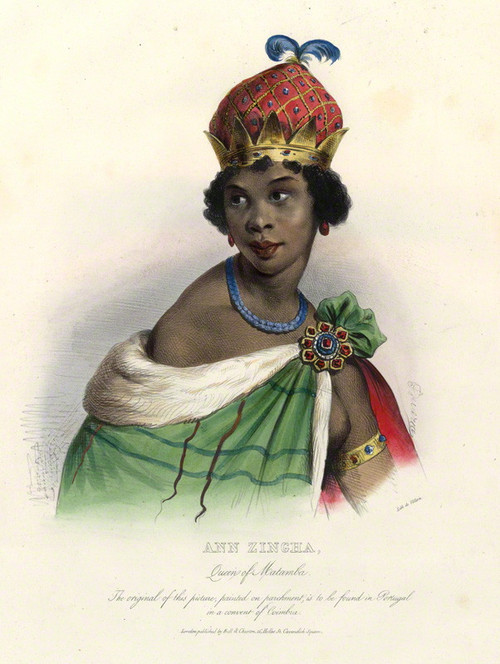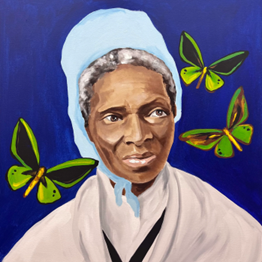Queen Njinga was the ruler of the Kingdom of Ndongo and the Kingdom of Matamba, a Queen of two nations, an enemy of the Portuguese, and a warrior to her people. Through a long-standing conflict between the Kingdom of Ndongo and the Portuguese, Queen Njinga dedicated more than half her life salvaging her kingdom from destruction. Her people were constantly attacked and lived in terror as the Portuguese invaded, and established a slave trade, and viciously murdered the population.1 Queen Njinga used amazing negotiation skills, acquired diplomacy knowledge, and utilized guerrilla warfare as a multifaceted approach to overthrow the Portuguese. Even though she fought fiercely and persistently for her people, she is scarcely mentioned in the pages of history. Countless books have been written regarding Queens of nations, but there is only one known book written in English about her life. Her story began in war.
In 1580, war broke out between the Ndongo and the Portuguese. There was bloodshed, and death lingered in the kingdom. Cries of innocent children being stripped away from their mothers and fathers, and being forced into cages that only led to death; it was an era of great anguish for the Ndongo people. Amidst this dark era, a new light shined in the kingdom, as a baby girl named Nzinga Mbandi was born. She was the daughter of King Kiluanji of Ndongo and what laid ahead was uncertain, due to her timing of birth. Legends say that when she was born, she had an umbilical cord wrapped around her neck. To the villagers, being born in such a way was a sign that that one would grow to become a powerful and proud person. Of course, Ndongo’s early years in a war-torn country led to a different kind of childhood. Instead of playing with children in the village, she attended diplomatic meetings with her father. Instead of getting to see the beautiful place she called home, she was forced to stay indoors as the outside was far too dangerous. With constant battles, Nzinga had to quickly learn how to survive and how to behave. This led her to grow up fierce, strong, and incredibly intelligent. Many viewed Nzinga Mbande as her father’s favorite. She was her father’s pride and joy, and throughout her childhood grew to understand the governance of the kingdom. She was able to witness her father take charge and protect his people. However, this favoritism did not go unnoticed.2
Disaster struck the kingdom in 1617, when her father died and the throne was given to the eldest, her cowardly brother Ngola. What created the depiction of him being cowardly was his incapacity to meet the expectations set by his family. He grew to be disrespected by the Portuguese government and his own people. This critique of him as a leader drove him mad. He felt paranoid that one day Nzinga’s only son would plot to have him assassinated. So instead, he ordered her son killed. He then forcibly had Nzinga sterilized, which ensured that she would never have a child again.3 He was seen as someone who didn’t have enough backbone to run a kingdom and he knew it himself. Everything he attempted failed, and he was viewed as a weak leader in the eyes of the Portuguese. Instead of creating diplomatic ties with the Portuguese, he waged war. He quickly scrambled together a large army to fight the Portuguese. Little did he know that the Portuguese also had plans to attack and conquer, and Ngola was no match.4 His war failed, as he couldn’t keep up with the constant attacks. Many lives were taken, villages burned, innocent children killed, and families torn apart. Due to high death tolls and Portuguese captives, the slave-trade became nearly impossible. As a result, Ngola decided to negotiate a peace treaty. Ngola knew that Nzinga was the only one who could negotiate this treaty, as she spoke fluent Portuguese. Nzinga was in pieces when she had heard the horrible stories that had happened to her people. This lead her to the decision to accept Ngola’s wishes and speak on his behalf.

This meeting became the most significant meeting in her life. Nzinga left for Luanda to negotiate the treaty with Dom João Correia de Sousa, the Portuguese Governor. She left with her head held high and pride running through her veins. On her journey she was engulfed with horror as she saw her people suffering. She watched, lost for words, as she saw them being sold into slavery.5 When she made her way to the room where negotiations would be made, she noticed there were chairs for the Portuguese individuals and only a mat provided for her. This type of behavior from the Portuguese was common; it was their way of displaying a “subordinate status, a status reserved for conquered Africans.” To subvert this disrespect, she had her maid be her chair while she spoke to the governor face to face. She made it clear to him that this was not a meeting where she would bow down to the Portuguese, but rather one where they would act as equals. This not only completed the task presented by her brother, but also enhanced her status. She wanted to be able to trade for firearms and other things necessary to strengthen her army. Unfortunately, she knew that the slave trade business would be the only way to eventually defeat the Portuguese and stop the over deportation of slaves. She negotiated to ship a certain amount of slaves to the Portuguese in exchange for firearms. Njinga knew that this would be the only way to stop slave trading of her people in the future. While the treaty was a success, it did require her conversion to Christianity, and she later changed her name to Anna de Sousa.6

This peace was short lived, as her brother had a sudden death. Her brother died of mysterious causes. Some accounts say that it was Nzinga who poisoned him.7 She wanted revenge for the death of her young child. Shortly after his death, the Portuguese went back on their agreement and declared war on Njinga as well as on other nearby tribes. This forced the new Queen to retreat and lead her people to the Kingdom of Matamba. Here she kidnapped Matamba’s Queen and army. From there, she made herself Queen and took over the kingdom. In the year 1641, Nzinga created an alliance between the Kingdom of Kongo and the Dutch.8 They had created this alliance with a vision of defeating the Portuguese and regaining the Kingdom of Ndongo, as well as protecting her people.
At this time, the Portuguese had continued to terrorize her land by developing headquarters in the town of Masangano. By the year 1644, she was able to conquer the Portuguese army that occupied Ngoleme. Unfortunately, this victory was short lived when she was unable to win the battle in Kavanga, the northern part of Ngondo.9 To make matters worse, her sister was captured by the Portuguese and, when they learned of her sister revealing valuable secrets to Nzinga, they killed her.10
Soon after, the Dutch, located in Luanda where Nzinga resided, sent reinforcements. Nzinga was able to track the Portuguese army and plan an attack. Despite her preparations, she was unable to defeat them. This led to the army then recapturing Luanda.11 She was determined to defeat the Portuguese and regain her land. She implemented guerrilla warfare on the Portuguese and fought fiercely for the next thirty years. In those thirty years, she created false alliances with neighboring kingdoms, used her mastered skill of negotiation with the Portuguese and Dutch, and offered protection for refugees who fled to her kingdom. Njinga’s negotiation skills were so successful because of her pride as well as her love for her culture and people. The clever use of her gender and her political understandings helped lay a foundation for future leaders of Ndongo today. She made it clear that she was not someone to mess with.
Queen Nzinga was willing to use her role as a woman as well as her role of the Queen of Ndongo. The humble beginnings of Nzinga’s guerilla tactics started in 1626, as Bento Cardoso, a leading general of Portugal, set out an army to defeat this troublesome queen.12 When the battle began, Nzinga had no allies that could help her. Even her closest supporters from her mother’s birth place of Pebo were imprisoned and sold into slavery. Not only was her army small, but as time progressed Cardoso gained more and more soldiers. Nzinga had begun to order trenches to be made around her island, created hidden caves, and stocked up on supplies to prepare her people for a potential long standing siege.13 She made sure that her army would be prepared and her communication with her army was impeccable. This led her to slowly become a political icon and fierce fighter. She never lost hope of regaining her land and knew deep in her heart that Ndongo would soon be returned. Her vision soon turned to reality when Salvador Correia, who was new to the land, realized that he could do nothing against this highly regarded fierce Queen, who by now was more than 70 years of age. The Portuguese then had decided to give up their claims to Ndongo and the land was returned to its rightful owner through a treaty ratified in Lisbon by King Pedro VI on November 24 1657.14
She then spent the rest of her days rebuilding her once lost kingdom. She will be remembered as the Mother of Angola, the fighter of negotiations, and the protector of her people. She is still honored throughout Africa as a remarkable leader and woman.

- Linda M. Heywood, Njinga of Angola: Africa’s Warrior Queen (Cambridge, Massachusetts: Harvard University Press 2017), 1. ↵
- Linda M. Heywood, Njinga of Angola : Africa’s Warrior Queen (Cambridge, Massachusetts : Harvard University Press, 2017), 56, 57, 58, 80-81. ↵
- Linda M. Heywood, Njinga of Angola : Africa’s Warrior Queen (Cambridge, Massachusetts : Harvard University Press, 2017., 2017), 50; “Njinga Mbandi: Queen of Ndongo and Matamba,” UNESCO Digital Library (website), accessed April 4, 2019, https://unesdoc.unesco.org/ark:/48223/pf0000230103; “Nzinga of Ndongo and Matamba . ↵
- Linda M. Heywood, Njinga of Angola : Africa’s Warrior Queen (Cambridge, Massachusetts : Harvard University Press, 2017., 2017), 44-46. ↵
- Linda M. Heywood, Njinga of Angola : Africa’s Warrior Queen (Cambridge, Massachusetts : Harvard University Press, 2017., 2017), 50; “Njinga Mbandi: Queen of Ndongo and Matamba,” UNESCO Digital Library (website), accessed April 4, 2019, https://unesdoc.unesco.org/ark:/48223/pf0000230103; “Nzinga of Ndongo and Matamba . ↵
- Linda M. Heywood, Njinga of Angola : Africa’s Warrior Queen (Cambridge, Massachusetts : Harvard University Press, 2017., 2017), 61-62. ↵
- Christine Saidi, “Njinga of Angola: Africa’s Warrior Queen,” Early Modern Women: An Interdisciplinary Journal 13, no. 1 (Fall 2018): 183–85. ↵
- Pat Masioni et al., “Njinga Mbandi: Queen of Ndongo and Matamba,” UNESCO Digital Library (website), accessed May 8, 2019, https://unesdoc.unesco.org/ark:/48223/pf0000230103. ↵
- Ubani Lumumba, Afrikan Mind Reconnection & Spiritual Re-awakening ( Bloomington, IN: Xlibris Corporation, 2011), 371-372. ↵
- Pat Masioni et al., “Njinga Mbandi: Queen of Ndongo and Matamba,” UNESCO Digital Library (website), accessed May 8, 2019, https://unesdoc.unesco.org/ark:/48223/pf0000230103. ↵
- Ubani Lumumba, Afrikan Mind Reconnection & Spiritual Re-awakening (Bloomington, IN: Xlibris Corporation, 2011), 372. ↵
- Linda M. Heywood, Njinga of Angola : Africa’s Warrior Queen (Cambridge, Massachusetts : Harvard University Press, 2017., 2017), 55-56. ↵
- Linda M. Heywood, Njinga of Angola : Africa’s Warrior Queen (Cambridge, Massachusetts : Harvard University Press, 2017., 2017), 80. ↵
- “Njinga Mbandi: Queen of Ndongo and Matamba,” UNESCO Digital Library (website), accessed April 4, 2019, https://unesdoc.unesco.org/ark:/48223/pf0000230103 ↵



113 comments
Vianne Beltran
Hi Rosario,
I thought your article was really interesting as it brought attention to a very little known historical figure. I thought it did a good job of highlighting what made her a fascinating and powerful ruler. My history textbook mentions Queen Nzinga briefly but there is so much more to her story. Your article summarized it well. I think her life would probably make a very interesting movie. I am curious to learn more about her.
Nooraldeen Aldrees
This Article is very remarkable because it touches on subject rarely discussed, which is how the African pollical atmosphere in the process of slave industry. Were Africans randomly captured by Portuguese, Spaniards, English, or Dutch? Or there was a supplier from the homeland that believed that humans can be sold as commodities? Adding the African supplier to the story adds a different element to slave trade in the 16th and 17th century. By the support of this article, it appeared to be that Africans were used, unfortunately, as an element in the negotiating card. Also, what was shocking when reading about Queen Nzinga is the use of sterilization as form of punishment to women. I wonder how they performed that procedure in that time; the process must have been very brutal. I would like to thank the writer for gathering the narrative in such a fluid style. I would believe it was not an easy task to compile this narrative considering the scarcity of sources about this influential political figure. Good job.
Grace Malacara
I had not heard of Queen Nzinga’s story until now. I really enjoyed reading your article, I can tell it was very well researched and you told her story in a truly captivating way. Her story is so inspirational, she was a very brave, strong woman who stood by her people until the end. The pains she endured of having to watch her people sold into slavery, and constantly be afraid of the Portuguese attacking pushed her to strive for safety for her people and she did just that for them.
Daniel Gimena
Very good article, which speaks about a the history of a continent that is usually forgotten by many of us; Africa.
I didn’t know about Queen Nzinga Mbande, but thanks to the author, now I know that Nzinga was a great queen because she is probably the best ruler that the Kingdoms of Ndongo and Matamba ever had. She was the only woman to control two nations, she fought a colonial empire like the Portuguese her whole life, and never surrounded to them. She dedicated her life to save her kingdom from destruction, defending it from the attacks of the Portuguese. She showed amazing negotiation skills, diplomacy knowledge, and used guerrilla tactics to overthrow the Portuguese that outnumbered her in nearly all occasions. She was a pride, very brave woman that lover her culture and her people, and gave everything to defend them from the horror of slavery. This is an amazing story about an amazing woman.
Jesslyn Schumann
Hello Rosario! This was a wonderful article that highlighted a very important woman during this time period. You brought her story to life by talking about from what she was born into, what she had to go through and endure, to her victory and success she faced at the end of her life. This really was engaging to hear about her struggles and how she was able to work through them and become a successor at the end.
Mauricio Rebaza Figueroa
Good night, Rosario. After reading this article, I could learn more about a part of the human history not many people know about and is the reaction African societies had when the European countries started conquering, colonized and enslaving them. You did a good job using many pictures related to the central topic and that helped me to put in context of the article. Overall you did a good job.
Katelyn Canales
Wow… I am appalled at how you made Nzinga Mbande’s story come to life. Mr. Moreno, I truly appreciate your work. Not only is it a unique story about one of Africa’s influential women in history, but it is also a story that really had a compelling narrative. The important key factors of her life were presented. Focusing on how she defended her people, her journey on conquering the Portuguese, and strategies for having a strong army. I liked how you pointed out in the introduction how her story has never really been told when compared to other Queens of Nations. I respect that idea because as a reader, it automatically makes us want to know more and keep reading. Great work!
Alex Trevino
I think this article really draws light to the resistance that the Europeans were met with during their time of acquiring slaves. Nzinga, despite the tragedies surrounding her, chose to stand tall in the face of adversity and become what should be known as one of the most impressive leaders in history. I feel that Nzinga has well earned her place in the history of the world and is an important figure that more should look into.
Carlos Hinojosa
This was a great article because I actually had no clue this happened nor have, I ever heard of this queen. So, this was a nice read since I got to learn something new and something pretty interesting. I mean to be able to hold of an empire that was vastly superior and the only reason your country failed was because you died. I think you were a pretty good leader so, that was very inspirational. I hope to read more by you in the future.
Gisselle Baltazar-Salinas
Hello Rosario! I have to start off by saying how great this article was. It was well written and had me engaged the entire story. I had never known about this moment in history, and as we continue with the lectures on the Atlantic Trade I hope we cover her and her story in class. Nonetheless, this was a great and important story to tell and one with a positive ending which is not common when we look at history. Great work!